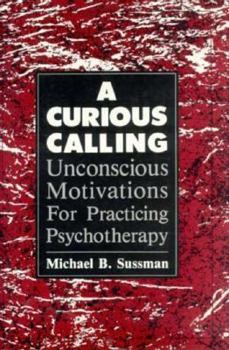A Curious Calling: Unconscious Motivations for Practicing Psychotherapy
Select Format
Select Condition 
Book Overview
"What brings you here?" is the standard question posed to patients at the outset of their therapeutic journey. In A Curious Calling, this question is posed to therapists themselves. Applicants to... This description may be from another edition of this product.
Format:Hardcover
Language:English
ISBN:0876685165
ISBN13:9780876685167
Release Date:January 1992
Publisher:Jason Aronson
Length:304 Pages
Weight:1.40 lbs.
Dimensions:1.2" x 6.3" x 9.2"
Customer Reviews
1 rating
Why do therapists do therapy?
Published by Thriftbooks.com User , 16 years ago
If I didn't know the psychotherapy profession and the psychology industry so well, I would be surprised that Dr. Sussman's A CURIOUS CALLING stands virtually alone in critically examining why therapists do the work they do. This review is for the second edition (2007). About half the book reviews and comments on the research literature on therapists' unconscious motivations. It is quite an extensive list, from power needs to ego needs to erotic impulses, masochism (as when therapists allow clients to be emotionally abusive), stuckness in old family patterns and pathologies, rescue fantasies, need for power and control, and so on. An overarching motive: Many therapists are trying to work out their inner conflicts. This is not necessarily a bad thing, and from a relational perspective is inevitable in some situations since the therapist's psyche forms part of the emotional matrix of the therapy. Some would also argue that being a wounded healer gives the work a freshness and urgency it might not have otherwise. The danger, of course, increases when the therapist underestimates such motivations and overestimates the degree to which they do this work to be helpful or caring. The next section of the book includes nine profiles of therapists interviewed to examine their underlying motivations for doing therapy. All had had their own therapy and at least three years of experience doing therapy. The interviews were semistructured and included forty-eight questions, one of which was, "What would you guess might be the most common unconscious motivation of your average colleague?" The results were very interesting, as were some of the therapists' comments. One remarks: "I can't think of a more masochistic profession." Another compares doing therapy to solving people's problems like Sherlock Holmes. Yet another speaks of "carrying my mother's colors" and being the family problem-solver. I was reminded of Abraham Maslow realizing only in his sixties that his emphasis on growth and wholeness was in part a rejection of his abusive mother's corrosive cynicism. A final section, Conclusions and Further Reflections, summarizes therapists' unconscious motivations and deals with issues of burnout, trainee selection and training, supervision, and personal therapy. I was fortunate in having such fine teachers in my years as a psychotherapist (I teach and write now), but others stand out as well, their motives well-described in Sussman's book: the analyst who asked me provocatively if I found her breasts milky enough (incest); the couples therapist who encouraged me to stay in a clearly failing marriage (overidentification); the social worker who cancelled my request for emergency transportation for a suicidal client because she wanted to handle it herself (politics); the supervisor who wanted to talk more about surfing than about therapy (narcissism); a trainee finally fired for impersonating a psychologist (narcissism, sociopathy); the nonprofit boss who ask




